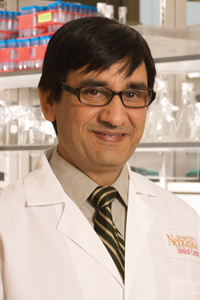 |
Dhirendra P. Singh, Ph.D. |
NOTE: This profile is part of a series highlighting the 23 researchers who were named UNMC Distinguished Scientists or New Investigators for 2008. Each of these researchers will be profiled in UNMC Today leading up to a March 16 ceremony to recognize their achievements.
- Name: Dhirendra Singh, Ph.D.
- Title: Professor
- Joined UNMC: 2002
- Hometown: Lucknow, India
Describe your research in laymen terms.
I am interested in unveiling the molecular mechanisms of cell survival/cell death. If we can understand what happens normally and what goes wrong, we hope to develop treatments for stress-induced human degenerative diseases.
What led you to pursue this area of research?
The realization that the stress response in mammals may be closely linked with many human diseases — including degenerative diseases of the nervous system, ocular disorders and cancer — has led to an explosion of our interest in this research area.
How do you see your research contributing to science?
On a broad level, our research is helping to show how and when cells become deficient in survival proteins, how survival processes go awry in various disease states, and how these survival proteins are regulated in cells facing stress. Fortunately, working with bright, energetic and talented researchers and collaborators, we discovered the novel survival proteins, Lens Epithelium-Derived Growth Factor (LEDGF) and Peroxiredoxin 6 (PRDX6). These proteins are real saviors, protecting cells and tissue against stressors. We are hoping that these molecules will be further developed as drugs to treat various stress-induced diseases or age-associated degenerative disorders.
Why did you become a scientist?
The life-changing experience of early education, my special interest in life science and a natural desire to understand the molecular biology of cells had planted in me an unquenchable desire to be a scientist.
What is your hope for the next generation of scientists?
I hope that their persistent efforts and energy will be able to solve the unsolved questions/problems of their research area and that their studies provide numerous novel ways to treat and cure human diseases.
Beyond grant funding, how do you measure success?
Being able to discover the undiscovered and being able to explain the novel research outcomes to an eager learner or to researchers.
What would you tell a student interested in a research career?
First, I would talk with the student about his or her background, goals and inner drive — all three of which are critical to success in science. Then I would regale them with inspirational tales about how interesting and useful science can be. I would emphasize that science is a systematic, disciplined and always open-minded method of discovering new things. I also would emphasize the need to let the science direct the aspiring scientist.
Do you have a hero/role model? If so, what do you admire most about this person?
My parents and my uncle, H.S. Singh, the greatest role models for me, influenced me to not set limits on what I could do, and taught me, “honesty is the best policy.” My Ph.D. adviser, Dr. R. K. Chatterjee, who could see I had potential invisible to me, taught me the joy of doing science.
Tell us about your family and hobbies outside of the lab.
My source of inspiration and happiness is my wife, Pramila, and my beautiful daughters, Vijeta, Vatsla and Prerna. Without their support and limitless love, I would not have been able to achieve my goals. Whatever I achieve in my life is dedicated to them. I have two brothers, Rama and Rajan, with unbreakable love, both in India. I love reading Scientific American, biographies of scientists and other books on the history of science and the origin of life and Earth. I also enjoy and relax with music.
List three things few people know about you.
- I believe in “The Free-Radical Theory Of Aging,” which was introduced by UNMC’s Denham Harman, M.D., Ph.D.
- I love eating out, especially Japanese food.
- I relax by watching and imagining nature’s heavenly creations.
Click here to see the UNMC Honors Web site, which features photos of profiles of the medical center’s Distinguished Scientists and New Investigators.